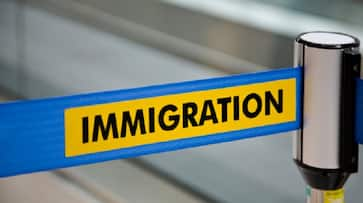UK Prime Minister said that henceforth, it will be a skills-based system where it is workers' skills that matter, not where they come from. "It will be a system that will scan across the globe and attract people with the skills we need," Theresa May said. Here are five ways in which the new immigration rules are set to affect Indians.
The major post-Brexit overhaul of the UK's immigration system unveiled by British Prime Minister Theresa May on Tuesday is likely to prove costly for Indians in the United Kingdom and those planning to have a career in the British territories.
"When we leave (the EU), we will bring in a new immigration system that ends freedom of movement once and for all. For the first time in decades, this country will control and choose who we want here," May said in a statement.
"It will be a skills-based system where it is workers' skills that matter, not where they come from. It will be a system that will scan across the globe and attract people with the skills we need," she said.
Here are five ways in which these new immigration rules will affect Indians:
1) New immigration system means increased restrictions on the chances of Indian workers and their families coming to the UK. Now, getting the family will require a sponsorship by the employer.
2) Britain to end freedom of movement. Thus, Indian citizens cannot look for a job in other member countries (EU) and work there without a permit. They can't reside there and stay after employment has ended.
3) With new rules, those working in the UK will have to meet higher criteria, especially higher salary to get their family to there too. However, the details on salary cut to avail this facility is not clear yet.
4) This rule also might put selection of married people to any company in the UK on hold and might give preference to bachelors as they do not fall under the 'bringing the family' condition.
5) UK government will also introduce “swift system of e-gate visa checks for tourists and visitors coming to the country for short- stay business trips". The problem arises while pointing out to risk assessments of different countries, especially overstaying. India is considered a high risk country in Britain. That might make checks stringent than before.
Last Updated Oct 3, 2018, 6:43 PM IST









![Salman Khan sets stage on fire for Anant Ambani, Radhika Merchant pre-wedding festivities [WATCH] ATG](https://static-gi.asianetnews.com/images/01hr1hh8y86gvb4kbqgnyhc0w0/whatsapp-image-2024-03-03-at-12-24-37-pm_100x60xt.jpg)
![Pregnant Deepika Padukone dances with Ranveer Singh at Anant Ambani, Radhika Merchant pre-wedding bash [WATCH] ATG](https://static-gi.asianetnews.com/images/01hr1ffyd3nzqzgm6ba0k87vr8/whatsapp-image-2024-03-03-at-11-45-35-am_100x60xt.jpg)


